Krishi-Vyavastha in Kumaon
A Post-Course Update on the second edition of our food and agriculture course.
एक महीने पहले तक आग में झुलस रहे कुमाऊँ के जंगलों को आषाढ़ की लगातार बारिश राहत ले के आई। बाँज के जंगलों की मौसमी धाराओं में फिर से पानी बहने लगा। खेत आलू, राजमा और सब्जियां के बीज से तैयार थे। स्वादिष्ट खुमानी और आड़ू से लदे पेड़ों पर बंदर और बच्चे लगाकर हमला कर रहे हैं और उनका लुत्फ उठा रहे हैं। गांव में खुमानी, आलूबुखारा और आड़ू की आखिरी पेटियाँ और सेब की पहली पेटियाँ भरी जा रही थी। पुरुष, महिलाएं और बच्चे फलों को लकड़ी के बक्सों में बड़ी सफ़ाई से पैक करके कभी सिर पर, कभी पीठ पर और कभी खच्चरों पर रखकर भीगे हुए पहाड़ी रास्तों से होते हुए, ऊपर की मुख्य सड़क तक बिक्री के लिए ले जा रहे थे। हर परिवार ने अपने बक्सों पर अलग-अलग चिह्न लगाए, उन्हें ट्रक में लादा और अपनी मेहनत का फल हल्द्वानी, दिल्ली और उसके आगे भेज दिया। इसी बारिश और फलों की कटाई के दौरान, हममें से कुछ लोग भारत की कृषि-व्यवस्था के बारे में सीखने के लिए 22 से 26 जून तक गांव में एकत्र हुए।
The showers of June brought much needed relief to the parched mountains of Kumaon. The forests, reeling from the forest fires raging just a month before were soothed by the incessant monsoon rains. Water was flowing again in the seasonal streams of the oak forests. The fields were sowed with potatoes, rajma and vegetables. Trees laden with delicious plums and peaches were being ambushed and relished by monkeys and children alike. The last batches of apricots, plums, and peaches and the first batches of apples were being harvested in the village. Men, women, and children carried the harvest, neatly packed in wooden boxes— sometimes on their heads, sometimes on their backs and sometimes on khacchars, through slippery mountain paths, up to the main road to a common spot. Each family marked their boxes with a distinct insignia, loaded them into a truck and sent off the fruit of their hardwork to Haldwani, Delhi and beyond. As the rains continued to pour and the fruit harvest carried on, some of us gathered in the village from June 22nd to 26th to learn more about food and agriculture.

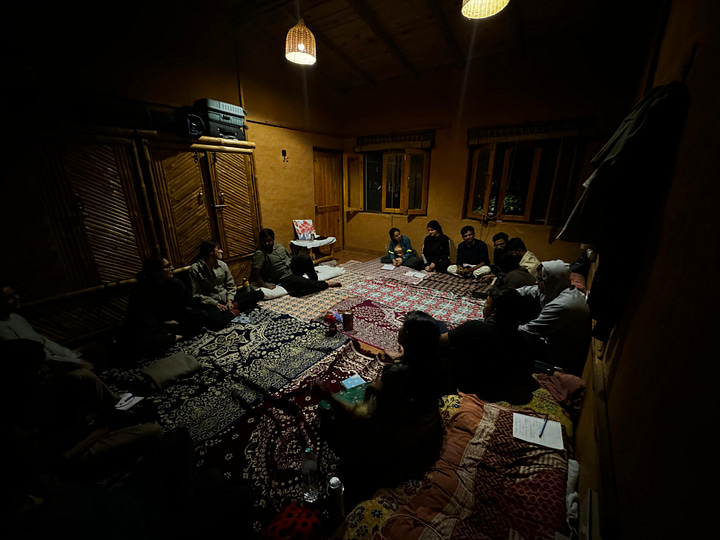
हम देश के अलग-अलग हिस्सों से आए थे — गुजरात, राजस्थान, उत्तर प्रदेश, पंजाब, दिल्ली, कर्नाटक और आंध्र प्रदेश से। हममें से कुछ लोग गांवों से थे, कुछ छोटे शहरों से, कुछ महानगरों से, कुछ विदेश से वापस आए थे और कुछ आगे की पढ़ाई के लिए विदेश जा रहे थे। हमारे बीच अर्थशास्त्र, समाजशास्त्र और भूगोल के छात्र थे, तो कुछ जलवायु अध्ययन और खाद्य नीति में काम करने वाले शोधकर्ता थे। कुछ प्राकृतिक खेती सीख रहे थे, कुछ सिविल सेवा परीक्षा की तैयारी कर रहे थे और कुछ अपने स्थानीय सांसदों और विधायकों के साथ विभिन्न जमीनी मुद्दों पर काम कर रहे थे।
We came together from different parts of the country— from Gujarat, Rajasthan, Uttar Pradesh, Punjab, Delhi, Karnataka and Andhra Pradesh. Some of us were from villages, some from small towns, some from metros, some who had come back from abroad and some who were going abroad for further studies. Among us were students of economics, sociology, and geography, while some were researchers working in climate think tanks and food policy. Some were learning natural farming, while some were preparing for the civil services exam and some were working with their local MPs and MLAs on various grassroots issues.
हमारे दिन की शुरुआत कुछ कृषि कार्य और श्रमदान से होती थी। हमने खेतों में हो रही घास को काटा, गाँव के पैदल रास्तों को साफ किया, बच्चों के साथ प्लास्टिक का कचरा उठाया और उनके साथ मिलकर फल बेचे। दिन का समय चर्चाओं में बीता। हमने अपने घरों में भोजन के साथ अपने अनुभव, अपने आहार और खाना पकाने की सामग्री की विविधता और भोजन को हमारी मेज़ तक पहुँचाने वाली व्यवस्था को एक दूसरे से साझा किया। पाँच दिनों में हमने राजनीतिक अर्थव्यवस्था, इतिहास, सामाजिक संबंध, भौतिक उत्पादन, पारिस्थितिकी, शिक्षा और दर्शन के सवालों पर गहराई से चर्चा की। हमने किसानों की स्थिति, हमारे भोजन और कृषि की स्थिति पर चर्चा की, जिसमें प्रत्येक प्रतिभागी ने अपने अनुभवों से विचार और किस्से साझा किए।
Our days began with some farm work and shramdaan. We cut the grass growing in the fields, cleared it from the village walking paths, picked plastic waste with children and sold fruits with them to tourists. In the daytime, we had our discussions. Each one shared their experience with food at their homes, bringing out a large diversity of diets and recipes. From there, we took a look at the supply chains which bring food to our tables. We discussed the conditions of farmers and the state of our agriculture, with each participant sharing reflections and anecdotes from their own experiences. Over five days, we delved into questions of political economy, history, social relations, material production, ecology, education, and philosophy.
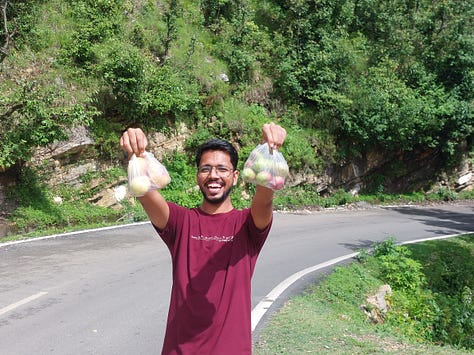


हमने अपनी दोपहरें नेगी जी और किशन दा के साथ जंगल के अलग-अलग हिस्सों में घूमने में बिताईं। नेगी जी ने हमें जंगलों की जटिल पारिस्थितिकी से परिचित कराया और इस क्षेत्र में बीहड़ में उगने वाले विभिन्न आहारों और जड़ी-बूटियों जैसे बथुआ और ब्राह्मी के बारे में बताया। उन्होंने हमें उत्तराखंड में पाए जाने वाले ढेरों तरह के चावल, दालों, चने, सोयाबीन, तिलहन और फलों की विविधता के बारे में बताया। इस विविधता के खत्म होने की कहानी भी बतायी और कैसे विविधता ख़त्म हो जाने से उत्तराखंड की पारिस्थितिकी, जलधाराओं, जानवरों, पक्षियों, कीड़ों और परागणकों और जंगल के समग्र स्वास्थ्य पर गंभीर प्रभाव पड़े हैं।
We spent our late afternoons taking walks in different parts of the forests with Negi ji and Kishan bhaiya. Negi ji acquainted us with the complex ecology of the forests and about the various uncultivated foods and herbs that grow in the area like bathua and brahmi, as well as ghirol and kairva. He told us about the diversity of varieties in rice, pulses, oilseeds, and fruits that were found in Uttrakhand and the rest of India, the story of the loss of this diversity, and how that loss has affected the ecology of the place - the water streams, the animals, birds, insects and pollinators, and the overall health of the jungle.
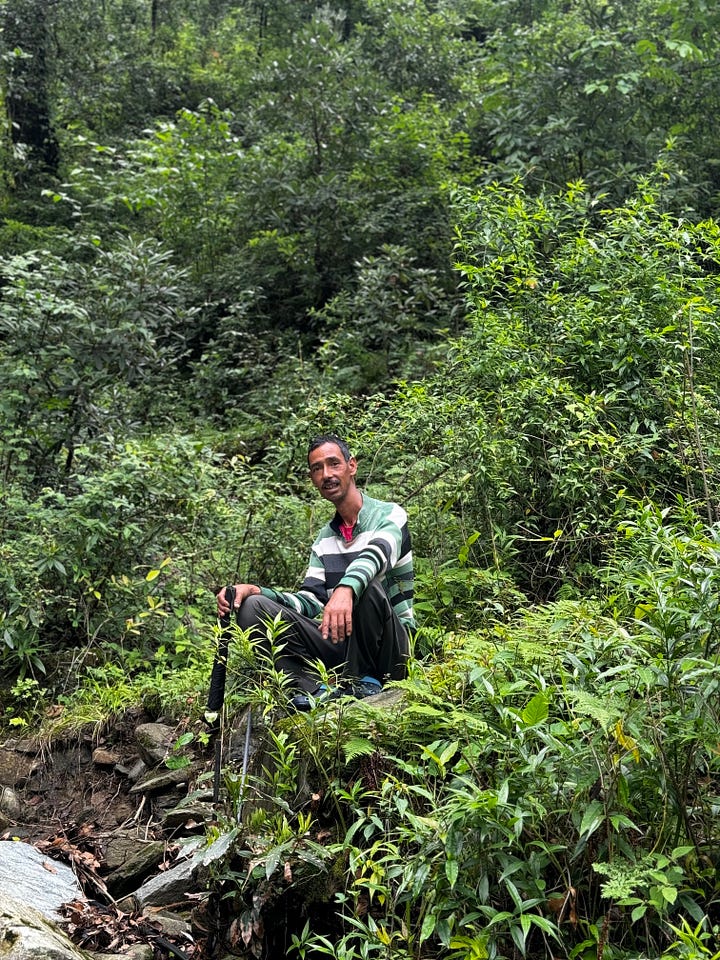
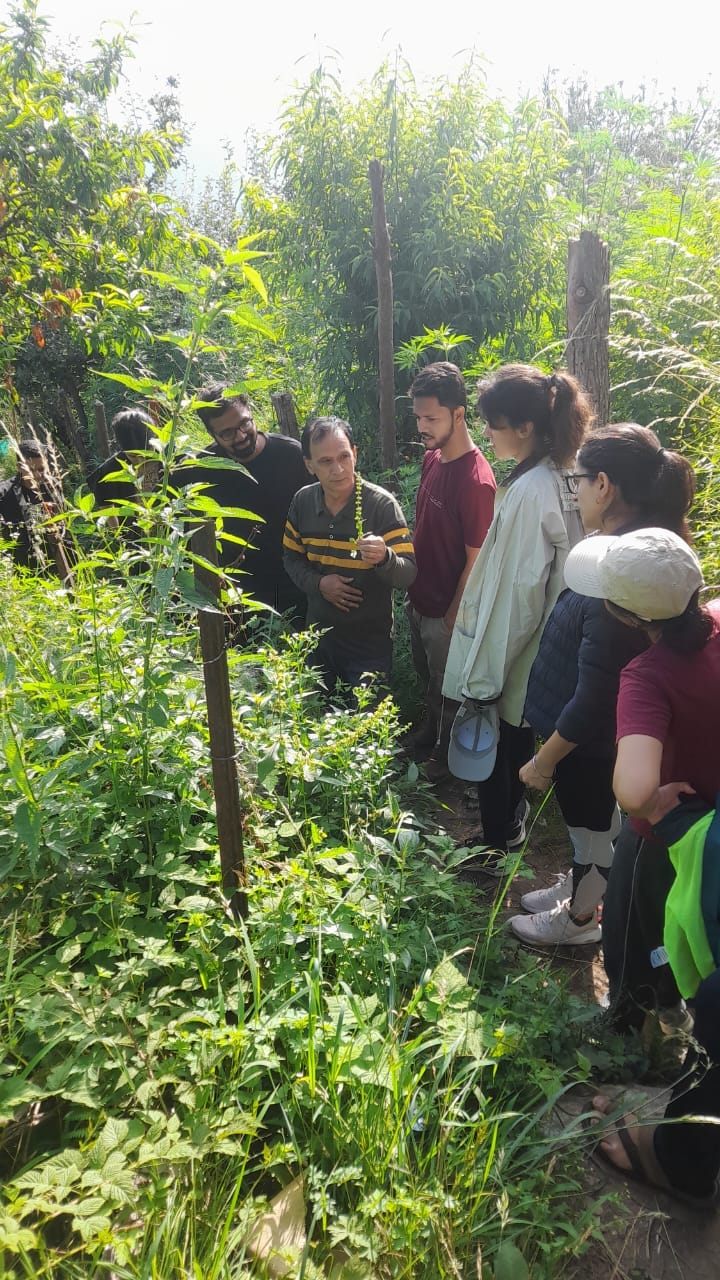
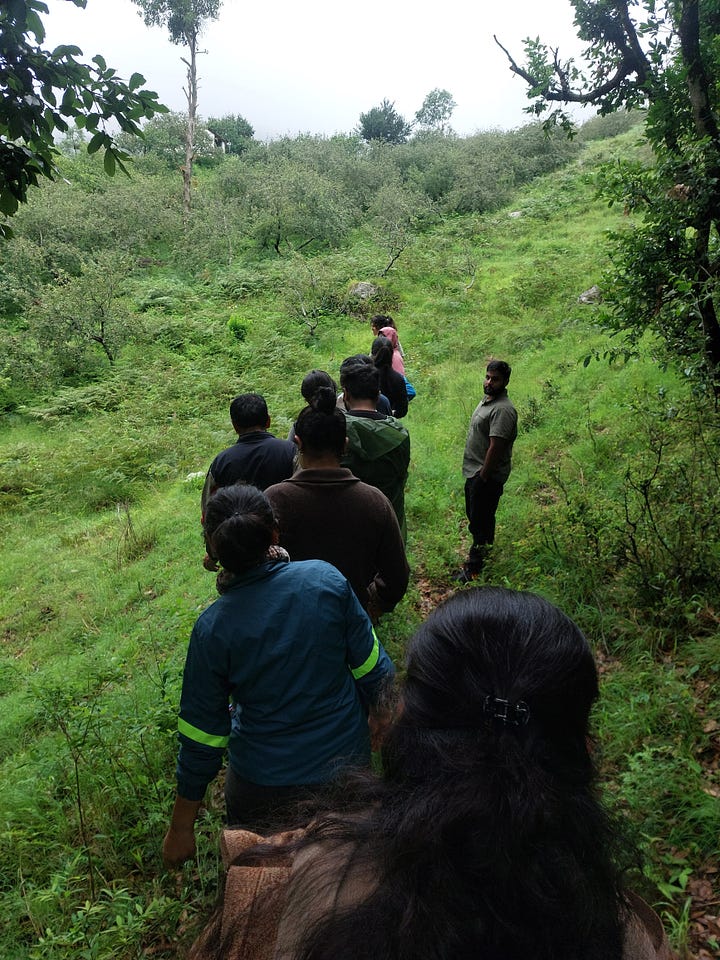
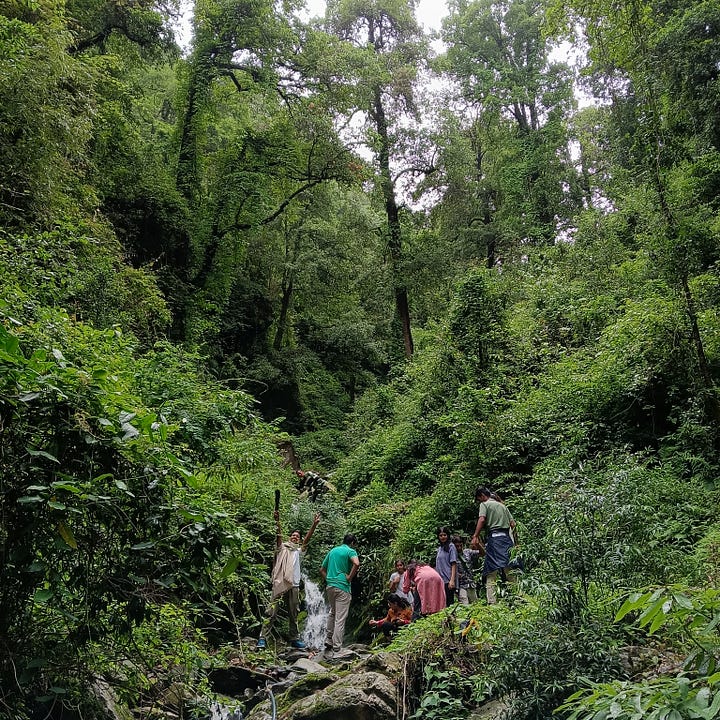
हमने किशन दा के साथ खाना पकाने और परोसने में समय बिताया, जिन्होंने हमें पहाड़ी रायता, खुरमानी चटनी, कढ़ी और जंगली रोजमेरी से बनी हर्बल चाय जैसी कई कुमाऊंनी खासियतें परोसी। किशन दा के साथ पास के गदेरे तक जंगल की सैर एक शानदार रोमांच भरी दोपहर में बदल गई, जब हम घने जंगल में खो गए और खून चूसने वाली जोंकों से निपटने का पहला अनुभव प्राप्त किया। इसने हमें पहाड़ों में जीवन की वास्तविकता, अपने आस-पास के वातावरण को करीब से जानने का महत्व, अनजान रास्तों पर चलते समय दोस्तों की उपस्थिति और कदमों की दृढ़ता के महत्व से अवगत कराया!
We spent time cooking and serving with Kishan bhaiya who treated us with many Kumaoni specialties like pahadi raita, khurmani chutney, jholi, and herbal chai made from the wild rosemary we foraged. A forest walk to the nearby gadera (mountain stream) with Kishan bhaiya turned into an afternoon of great adventure when we found ourselves climbing through the dense forest in the company of leeches. It made sure we realised the reality of life in the mountains, the value of intimately knowing your surroundings, the company of friends while walking untrodden paths, and the importance of firm footing!
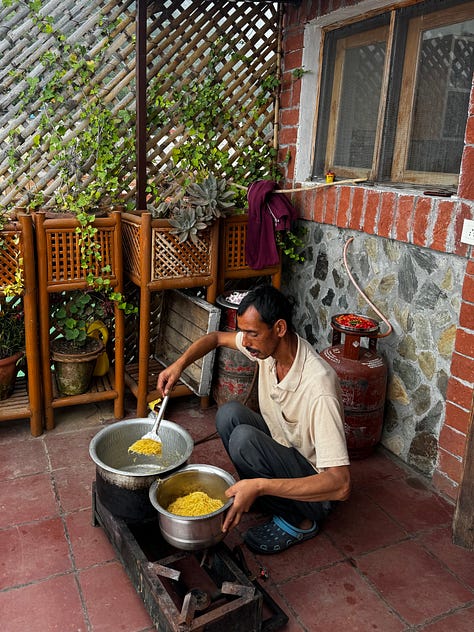
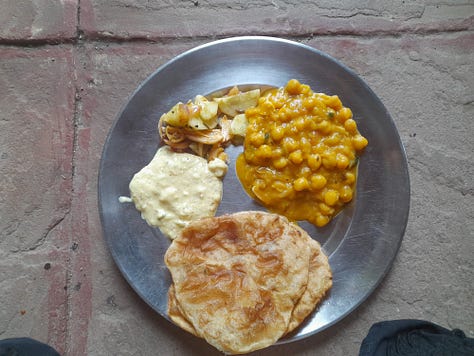
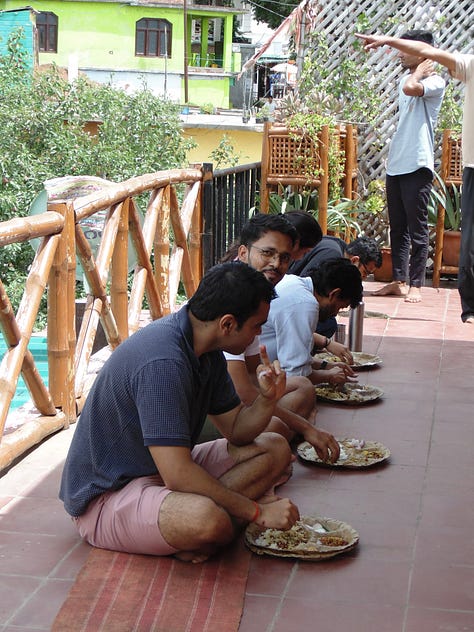
મારો આ પાંચ દિવસીય કૃષિ વ્યવસ્થા કોર્સ નો અનુભવ ખૂબ યાદગાર હતો. મારા માટે ઉતરાખંડના પહાડી વિસ્તારમાં આ પહેલો અનુભવ હતો. આ પાંચ દિવસ દરમ્યાન કૃષિ અને તેની આસપાસના વિષય પર ચર્ચાયેલ વાતો ખૂબ ઉપયોગી અને રસપ્રદ હતી. અહીં ચર્ચાયેલ મુદ્દાઓ એ મારી જાણવાની અને વાંચવાની ઈચ્છા ને પ્રબળ બનાવી છે. આ વિસ્તારનું પ્રાકૃતિક સૌંદર્ય અને શાંતિ મારી આંખોમાં ફિલ્મની જેમ સચવાયેલ રહેશે. હું પગદંડી સાથે જોડાયેલ બધાજ વ્યક્તિઓનો હૃદયથી આભાર માનું છું.
(इस पाँच दिवसीय कृषि प्रबंधन पाठ्यक्रम में मेरा अनुभव बहुत यादगार रहा। उत्तराखंड के पहाड़ी इलाकों में यह मेरा पहला अनुभव था। इन पाँच दिनों में कृषि और उससे जुड़े विषयों पर बातचीत बहुत उपयोगी और रोचक रही। यहाँ चर्चा किए गए मुद्दों ने मेरी सीखने और पढ़ने की इच्छा को और मजबूत किया है। इस क्षेत्र की प्राकृतिक सुंदरता और शांति मेरी आँखों में एक फिल्म की तरह बसी रहेगी। मैं इस पगडंडी से जुड़े सभी लोगों का तहे दिल से शुक्रिया अदा करना चाहूँगा।)
- Aryan Pansheriya, Student of Natural Farming, Bhavnagar, Gujarat
The week with pagdandi was a chance to pause, reflect and reorient. Working to design future food systems while living in the city, it is easy to forget who you are working for and the lives you are impacting.
Through the thoroughly researched classroom sessions, conversations with field experts and immersion into daily farm work, I discovered entirely new perspectives to familiar problems. The week began with a question around our individual relationships to food leading us into a deep dive into the historical and political context of the Indian economy. We looked back to understand how we got to where we are and whether the past offered us lessons for how we can think about our collective future. While I went in seeking answers I left with entirely new lines of inquiry.
Beyond the academic sessions it was the lessons I learned from the people I was journeying with that left its deepest mark. In between casual conversations during forest walks and classroom reflections over afternoon chai, I got a glimpse into worlds I have not been privy to - and I hope I was also able to share more from mine. I know we will continue to remain in touch.
- Nicole Rocque, Food Policy Researcher, Bangalore
The experience expanded my understanding of the ‘agrarian’ through different analytical themes, be it history, technology, the politics of development. I enjoyed learning how agrarian systems are embedded in all our lives and the trajectories they have taken to get to where they are today. It made me rethink my knowledge base and seek my own answers, without taking anything as a given.
I also really enjoyed how natural and community centred the course setting was. I loved getting to live and learn in the village, surrounded by clear skies, the hills and trees. My biggest takeaway was the emphasis on moral economy and what it means to live as a community, as a people. The centrality of human relations was not just something we spoke of in sessions but experienced among ourselves in shared spaces, meals, walks, farm work and games of antakshari. Getting to know a diverse group of people exposed me to different ways of thinking and being, something that will stay with me for a long time.
- Prerna Upreti, MA Sociology Student, Delhi School of Economics
One week on, I’ve found myself reflecting on our sessions and discussions often. I have talked about Nero’s Guests with friends and family who were equally interested in what we got on to. In the run up to the course, I was clear that eventually ਆਪਣੇ ਹੱਥੀ ਕੁੱਛ ਕਰਨਾ ਹੈ and this idea has only gotten more direction since we all convened in Kumaon. Although the rainy weather did not permit as much farming as we would‘ve liked, I was quite smug to be proclaimed a natural with the sickle (there’s certainly more where that comes from)! It was rewarding to be sat in a room with people who were there willingly, undertaking long journeys to come together. We shared knowledge around our agricultural contexts, the foods we have grown up with, and the culture around nutrition in our homes. It is my intention to remain involved with Pagdandi but more than that, I hope I can (alongside the support of many others) create something in Amritsar that is worth visiting for successive groups undertaking the Collective’s courses and fellowships.
- Aalekh Kaur, Researcher and Cultural Curator, Amritsar
यह कोर्स दुत्कानेधार के लोगों, हमारे प्रिय किशन दा , सूरज भाई , हरीश भाई और उनके परिवारों की उदारता और मदद से संभव हुआ। यह कोर्स हमारे शुभचिंतकों, मित्रों और पूर्व प्रतिभागियों के सहयोग से भी संभव हो पाया है, जो हमें आगे बढ़ने में मदद करते हैं। पगडंडी कलेक्टिव छोटे-छोटे योगदानों की मदद से अपना काम जारी रख पा रहा है। इस सहयोग के लिए हम अपने संरक्षकों के प्रति हार्दिक कृतज्ञता व्यक्त करते हैं।
The course was offered with the generosity and help of the people of Dutkanedhar, our beloved Kishan bhaiya, Suraj bhaiya, Harish bhaiya, and their families. This course was also made possible from the support of our well wishers, friends and past participants who keep us going. Pagdandi Collective is able to continue its work with the help of small contributions. We feel a deep sense of gratitude towards our patrons for this support.
अगर आप भी हमारे काम में सहयोग करना चाहते हैं, तो कृपया pagdandi.collective@gmail.com पर हमसे संपर्क करें। योगदान भेजने के लिए, कृपया UPI नंबर 8056219285 (कृपया 'पगडंडी के लिए' लिखें) का उपयोग करें या बैंक विवरण के लिए हमसे संपर्क करें।
If you would also like to support our work, please reach out to us at pagdandi.collective@gmail.com. To send a contribution, please use the UPI number 8056219285 (please mention ‘for pagdandi’) or get in touch for bank details.



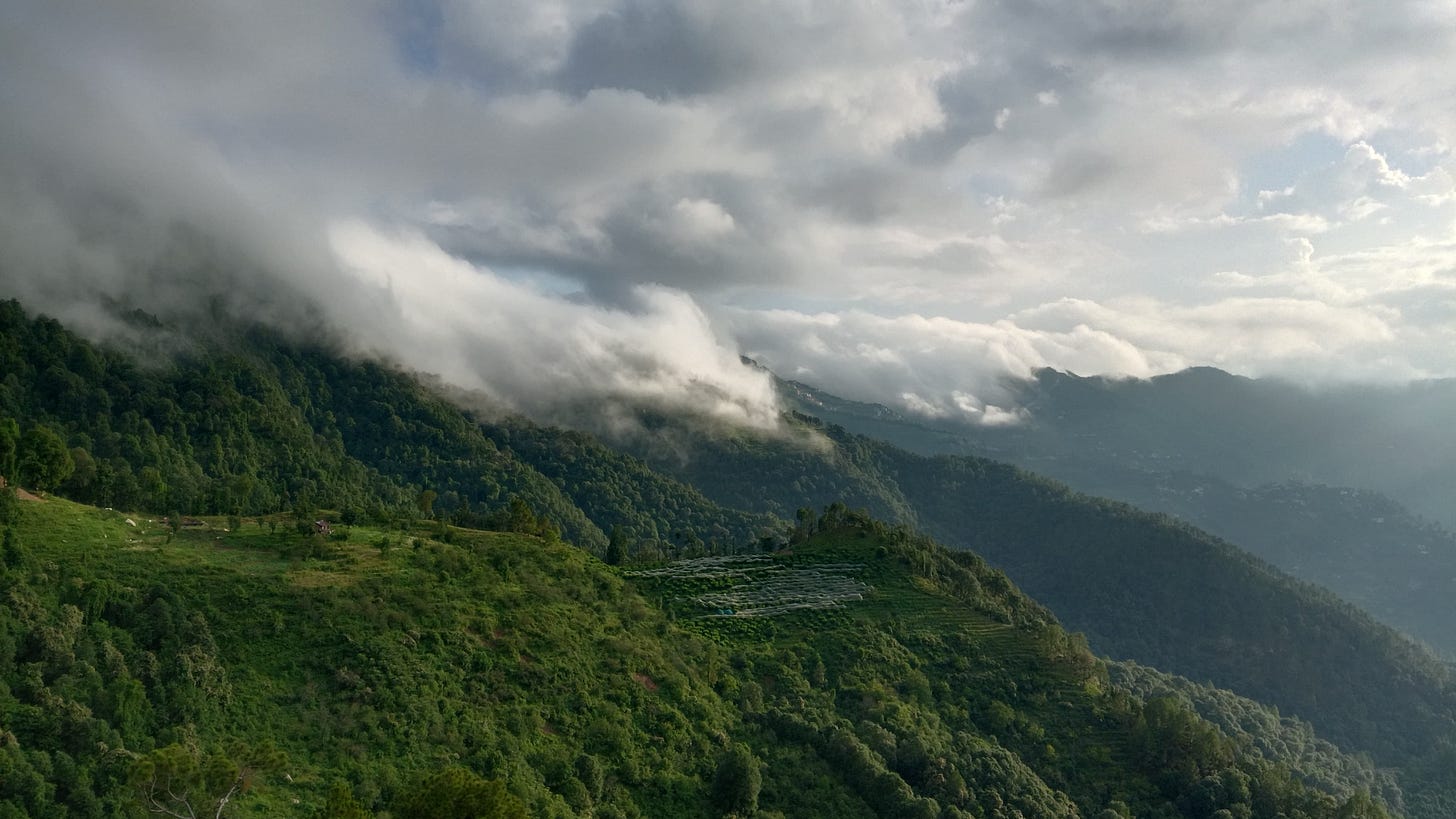
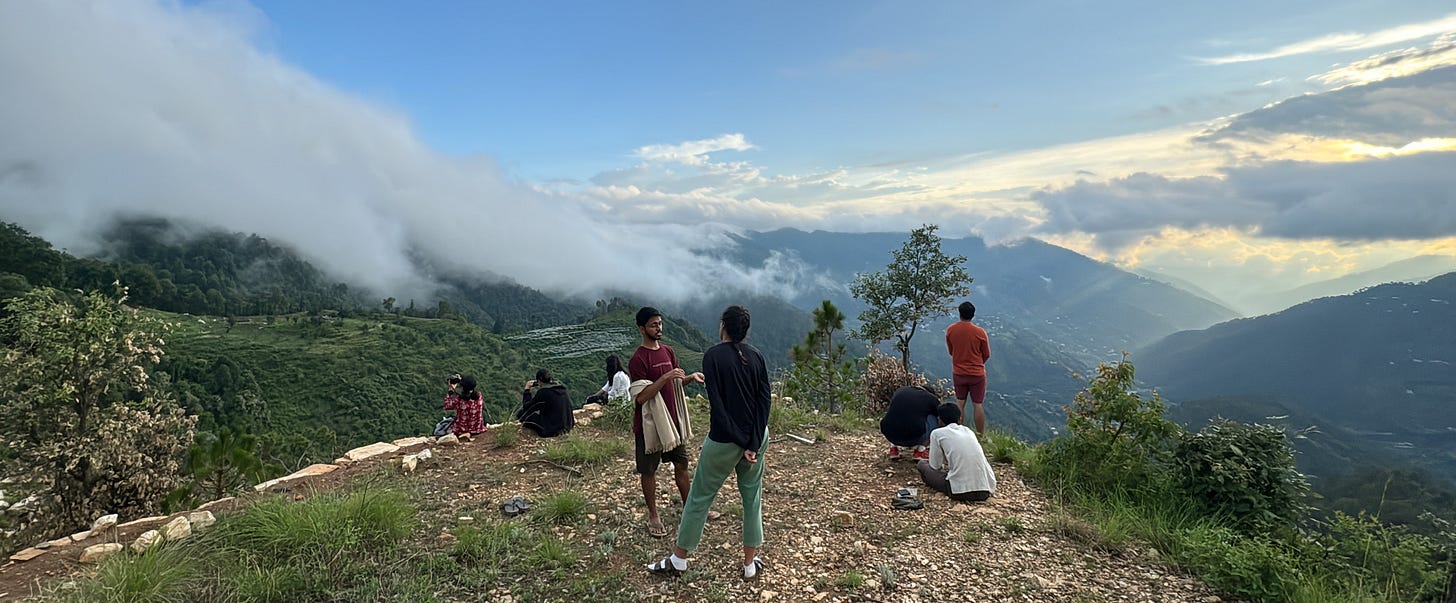

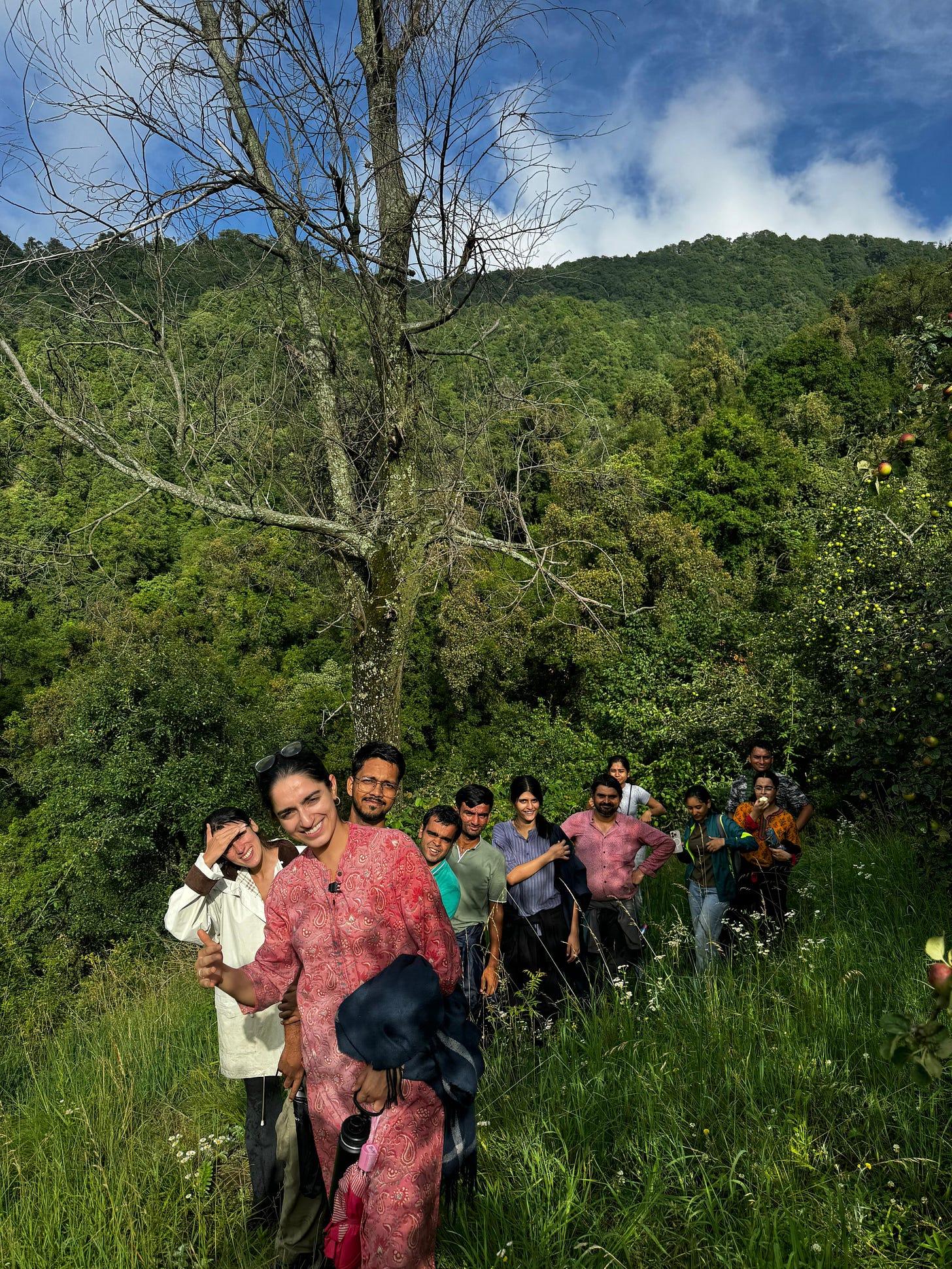

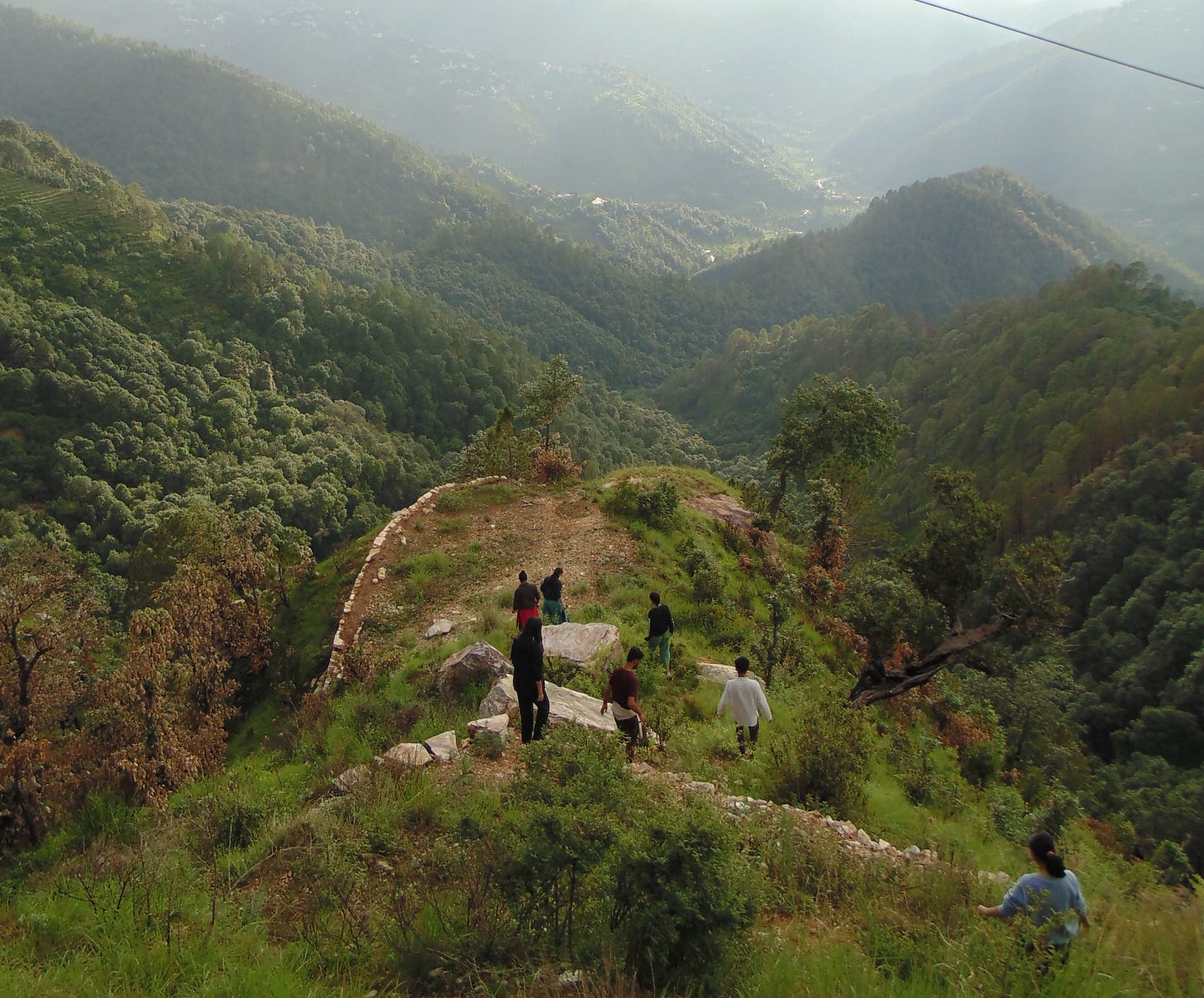


Ever grateful to Pagdandi for bringing us together and to have spent this time in Kumaon.
Feels so grounded, curious and expansive experience. Thank you to the wonderful team for creating this!